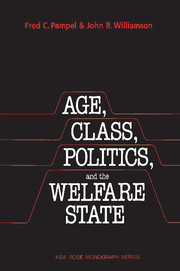Book contents
- Frontmatter
- Contents
- List of tables
- Preface
- 1 The welfare state: some neglected considerations
- 2 Theoretical perspectives on the welfare state
- 3 Social welfare spending in advanced industrial democracies
- 4 Social welfare spending and democratic political context
- 5 Economic growth, social welfare spending, and income inequality
- 6 Infant mortality, equality, and social welfare spending
- 7 Conclusions: The causes and consequences of the welfare state
- References
- Index
- Other books in the series
Preface
Published online by Cambridge University Press: 30 April 2010
- Frontmatter
- Contents
- List of tables
- Preface
- 1 The welfare state: some neglected considerations
- 2 Theoretical perspectives on the welfare state
- 3 Social welfare spending in advanced industrial democracies
- 4 Social welfare spending and democratic political context
- 5 Economic growth, social welfare spending, and income inequality
- 6 Infant mortality, equality, and social welfare spending
- 7 Conclusions: The causes and consequences of the welfare state
- References
- Index
- Other books in the series
Summary
Current orthodoxy views expansion of the welfare state as the result of conflict between labor (i.e., unions) and capital and the political parties that represent each class. Theorists differ on whether worker or capital interests drive the growth of welfare spending, whether benefits improve the conditions of the poor or the environment for capital accumulation, and whether class-based parties differ in their ability to implement redistributive programs. Still, the unquestioned acceptance of capital and labor as the major actors in the welfare state characterizes the field today. The neo-Marxist, class-based approaches to government, politics, and stratification have replaced the more nonideological, apolitical, and technocratic views common during the 1950s and correctly emphasize conflict, politics, and the power resources of social factions. At the same time, the current literature has come to incorporate politics and the state as crucial components of the welfare state. Whatever the conceptualization of the stratification system and the division of interests within the welfare state, the mechanisms by which classes, groups, and actors influence public policy must include politics and the state. Current efforts by neo-Marxists and others in this regard have improved on earlier technological and class-based functionalist theories that emphasize the automatic response of societies and governments to technological and demographic change or to crises of capital accumulation.
The conventional views, however, may fail to deal with groups crucial to the growth of the welfare state that do not fit the division between labor and capital.
- Type
- Chapter
- Information
- Age, Class, Politics, and the Welfare State , pp. xiii - xviPublisher: Cambridge University PressPrint publication year: 1989

